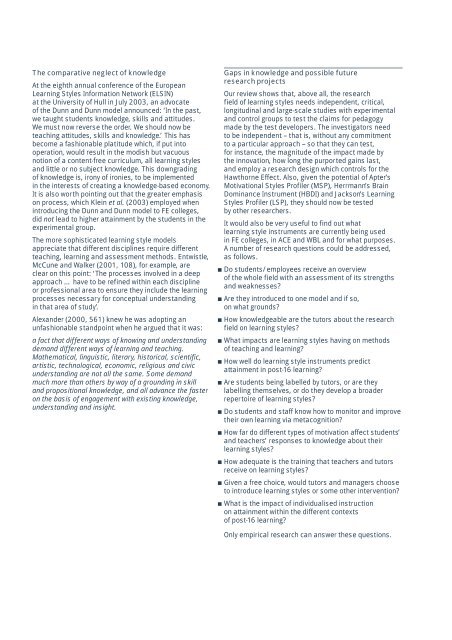learning-styles
learning-styles
learning-styles
You also want an ePaper? Increase the reach of your titles
YUMPU automatically turns print PDFs into web optimized ePapers that Google loves.
The comparative neglect of knowledge<br />
At the eighth annual conference of the European<br />
Learning Styles Information Network (ELSIN)<br />
at the University of Hull in July 2003, an advocate<br />
of the Dunn and Dunn model announced: ‘In the past,<br />
we taught students knowledge, skills and attitudes.<br />
We must now reverse the order. We should now be<br />
teaching attitudes, skills and knowledge.’ This has<br />
become a fashionable platitude which, if put into<br />
operation, would result in the modish but vacuous<br />
notion of a content-free curriculum, all <strong>learning</strong> <strong>styles</strong><br />
and little or no subject knowledge. This downgrading<br />
of knowledge is, irony of ironies, to be implemented<br />
in the interests of creating a knowledge-based economy.<br />
It is also worth pointing out that the greater emphasis<br />
on process, which Klein et al. (2003) employed when<br />
introducing the Dunn and Dunn model to FE colleges,<br />
did not lead to higher attainment by the students in the<br />
experimental group.<br />
The more sophisticated <strong>learning</strong> style models<br />
appreciate that different disciplines require different<br />
teaching, <strong>learning</strong> and assessment methods. Entwistle,<br />
McCune and Walker (2001, 108), for example, are<br />
clear on this point: ‘The processes involved in a deep<br />
approach … have to be refined within each discipline<br />
or professional area to ensure they include the <strong>learning</strong><br />
processes necessary for conceptual understanding<br />
in that area of study’.<br />
Alexander (2000, 561) knew he was adopting an<br />
unfashionable standpoint when he argued that it was:<br />
a fact that different ways of knowing and understanding<br />
demand different ways of <strong>learning</strong> and teaching.<br />
Mathematical, linguistic, literary, historical, scientific,<br />
artistic, technological, economic, religious and civic<br />
understanding are not all the same. Some demand<br />
much more than others by way of a grounding in skill<br />
and propositional knowledge, and all advance the faster<br />
on the basis of engagement with existing knowledge,<br />
understanding and insight.<br />
Gaps in knowledge and possible future<br />
research projects<br />
Our review shows that, above all, the research<br />
field of <strong>learning</strong> <strong>styles</strong> needs independent, critical,<br />
longitudinal and large-scale studies with experimental<br />
and control groups to test the claims for pedagogy<br />
made by the test developers. The investigators need<br />
to be independent – that is, without any commitment<br />
to a particular approach – so that they can test,<br />
for instance, the magnitude of the impact made by<br />
the innovation, how long the purported gains last,<br />
and employ a research design which controls for the<br />
Hawthorne Effect. Also, given the potential of Apter’s<br />
Motivational Styles Profiler (MSP), Herrmann’s Brain<br />
Dominance Instrument (HBDI) and Jackson’s Learning<br />
Styles Profiler (LSP), they should now be tested<br />
by other researchers.<br />
It would also be very useful to find out what<br />
<strong>learning</strong> style instruments are currently being used<br />
in FE colleges, in ACE and WBL and for what purposes.<br />
A number of research questions could be addressed,<br />
as follows.<br />
Do students/employees receive an overview<br />
of the whole field with an assessment of its strengths<br />
and weaknesses?<br />
Are they introduced to one model and if so,<br />
on what grounds?<br />
How knowledgeable are the tutors about the research<br />
field on <strong>learning</strong> <strong>styles</strong>?<br />
What impacts are <strong>learning</strong> <strong>styles</strong> having on methods<br />
of teaching and <strong>learning</strong>?<br />
How well do <strong>learning</strong> style instruments predict<br />
attainment in post-16 <strong>learning</strong>?<br />
Are students being labelled by tutors, or are they<br />
labelling themselves, or do they develop a broader<br />
repertoire of <strong>learning</strong> <strong>styles</strong>?<br />
Do students and staff know how to monitor and improve<br />
their own <strong>learning</strong> via metacognition?<br />
How far do different types of motivation affect students’<br />
and teachers’ responses to knowledge about their<br />
<strong>learning</strong> <strong>styles</strong>?<br />
How adequate is the training that teachers and tutors<br />
receive on <strong>learning</strong> <strong>styles</strong>?<br />
Given a free choice, would tutors and managers choose<br />
to introduce <strong>learning</strong> <strong>styles</strong> or some other intervention?<br />
What is the impact of individualised instruction<br />
on attainment within the different contexts<br />
of post-16 <strong>learning</strong>?<br />
Only empirical research can answer these questions.


